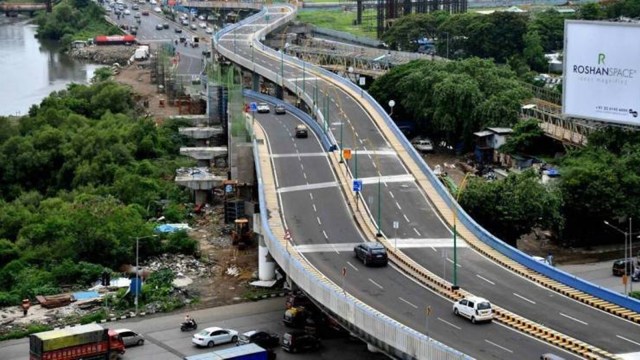
“There is a tide in the affairs of men”, Brutus had said, “which, taken at the flood, leads on to fortune; omitted, all the voyage of their life is bound in shallows and in miseries.” Brutus may have missed the Jio MAMI Mumbai Film Festival 2023 (Mumbai Film Festival) by a few millennia, but his words could well have served as a slogan for this event held between October 27 and November 5.
Once you purchased a pass to attend the Mumbai Film Festival, the tide in your affairs began every day at 8 am. This was the time when you had to log into a ticketing platform and reserve your seat for the movies that would be screened the next day. True to Brutus’s prescient warning, this tide had to be taken at the flood. If you tarried for even a minute, the tide would ebb and you would be left stabbing at your phone with an ineffectual finger as the screen displayed the dreaded words: Sold Out. Your life would then be bound in the misery of waiting in serpentine queues for hours – where hundreds vied to occupy the few “walk-in seats” — with no guarantee of crossing the threshold of the theatre.
If you, like me, are a casual movie enthusiast — a dilettante of cinema — then you may have felt a sense of bemusement during the hours you spent standing in those queues. While people around you discussed films and filmmakers you’d never heard of, you are likely to have shuffled your feet and recalled the scant titles in your viewing history. If pressed, you could drop a few names – Bergman, Kurosawa, Fellini – but you were as familiar with their oeuvre as the Mumbai Film Festival organisers were with the concept of counting. (But one must not be unkind: Perhaps subtracting the number of reservations from the total capacity of a theatre to know the number of available seats for those in the walk-in queues, is harder than it sounds; perhaps inspired by the plotlines of certain award-winning films featured in the festival, the seemingly simple rules of mathematics had also turned ambiguous.) In conversations with strangers, you may have sheepishly admitted that you’ve never watched Citizen Kane or the Apu Trilogy; that you quite enjoyed Jawan and barely ever use your subscription with Mubi (the curated movie streaming platform); and that you bought a pass to the Mumbai Film Festival entirely on a whim.
As it happens, life has a habit of turning interesting whenever you take a plunge into the unknown. Only an impulsive decision to attend a film festival with negligible knowledge about the line-up, can bring you into contact with worlds and ideas that are, at once, different and resonant. It can lead you to watch a heart-breaking Nepali gem — Gau Ayeko Bato (A Road To A Village) — exploring how the wheels of development and modernity can crush rural, indigenous communities. It can show you how the craft and mastery of a consummate storyteller — the Japanese director, Hirokazu Kore-eda — can elevate a heart-warming tale into the realm of high art (Monster). It can compel you to bear witness to the horrors and ravages of war (20 Days in Mariupol) and lay bare the sexual frustration lurking under the “sanskari” surface of Indian society (Agra).
Film festivals also present those rare occasions when creators and consumers can interact directly; the former explaining their motivations and the latter querying them about their process. In a Q&A session after the screening of Gau Ayeko Bato, the director-writer Nabin Subba explained how the film was written over seven years, after plumbing astonishing depths of research. So insistent was their desire to create an authentic depiction of the local community, for instance, that they even avoided using certain colours in the costume design. In another discussion following the premiere of Everybody Loves Sohrab Handa, the filmmaker Rajat Kapoor was asked what he meant by having a character in the movie respond to the query, “What will save us?”, with the single word, “Beauty”. With a wry smile, Mr Kapoor remarked that the meaning was probably known to the person who originally wrote it: Froyodor Dostoevsky. These conversations, made possible only in this setting, revealed the meticulous work that happens behind the scenes and how both inspiration and invention can play crucial roles in the weaving of stories.
There was much that could unnerve a first-timer at the Mumbai Film Festival. To begin with, there was the overwhelming festival schedule. For those afflicted with FOMO — and who amongst us is safe from this scourge? — the act of poring over listicles and shortlisting the “must-watch” movies, was in itself a nightmare. Then, there was the making of itineraries and careful choosing of transport to implement ambitious (and ultimately, unsuccessful) plans of watching a morning show in Colaba and an afternoon show in Goregaon. And there was, of course, the thrilling uncertainty of it all; the rollercoaster of emotions triggered while waiting with the walk-in crowds, fanning the faintest flames of hope, only to be spurned by the ushers.
Yet, at the end of five days and seven movies, your memory of these travails is tinged with fondness. You remember the people you met, the jokes you shared with them, and the copious amounts of popcorn you consumed. There were some setbacks, yes, and many movies you missed. But you prefer thinking about the ones you discovered, the ones that moved you or left you awestruck. The Mumbai Film Festival reminded you why you had paid for that dormant Mubi subscription, after all. Perhaps now, it was time to finally start using it.
The writer is a Mumbai-based lawyer.